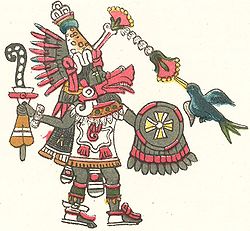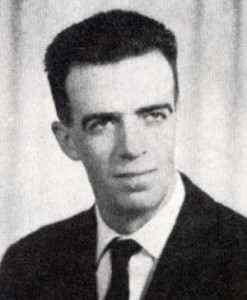Peter Kolosimo
Quetzalcoatl
 Quetzalcoatl is a Mesoamerican deity, whose name in the local Nahuatl language means ‘feathered serpent’. To the Aztecs he was a creator god and also had a parallel in Mayan culture to whom he was known as Kukulcan or Gucumatz.
Quetzalcoatl is a Mesoamerican deity, whose name in the local Nahuatl language means ‘feathered serpent’. To the Aztecs he was a creator god and also had a parallel in Mayan culture to whom he was known as Kukulcan or Gucumatz.
For some centuries it has been generally thought that the Aztec Emperor Moctezuma II initially believed that Hernán Cortés’ arrival to be the anticipated return of their deity Quetzalcoatl. The veracity of this story has come under increased attack, exemplified by a paper from Jordan Baker(b).
>>Michael MacRae in Sun Boat: Odyssey Deciphered [985] he identified Quetzalcoatl with Homer’s Odysseus.<<
It is a commonly held belief among Mormons that Quetzalcoatl was Jesus Christ!
More widespread and a little less contentious is the idea that St. Thomas the Apostle was Quetzalcoatl(e). “Within two decades of the Conquest, Quetzalcoatl was identified with St. Thomas, the wandering apostle. Since that time Quetzalcoatl has been described as a Viking, a Chinese Explorer, an extraterrestrial, Moses, and Jesus Christ. Similarly, most Mormons assume that the legends of Quetzalcoatl were simply distorted reminiscences of the visit of Christ to the New World as detailed in the Book of Mormon”(f).
An Indian website vehemently disputes the association of St. Thomas with Quetzalcoatl and for good measure also argues against the idea of St. Thomas in India!(g)
Harold T. Wilkins claimed [363.97] that Quetzalcoatl was from Atlantean Brazil.
Pierre Honoré claimed[0956] that these white gods had come from the region of Crete and had brought with them their script. As Linear A & B had both ceased being used by 1400 BC, Honoré surmised that visits of these deities had taken place before that date.
Lewis Spence also claimed an Atlantis connection for Quetzalcoatl, identifying the Mesoamerican deity as Atlas.
>>Gene D. Matlock has proposed that Quetzalcoatl had arrived in Mexico from India(h).<<
Daniel Fleck had some interesting thoughts on Quetzalcoatl(c).
Christian O’Brien has proposed that Quetzalcoatl had been one of the Sages who originated in Sumeria and travelled the world spreading advanced knowledge, including astronomy and megalith building [1797.117]!
In 1900 Peter de Roo concluded, “that Quetzalcoatl was a Christian prelate who landed in America, accompanied by several inferior missionaries and a number of people from some part of Christian Europe, and that he established a settlement in the territories of the Mexican empire or, perhaps, on the eastern coasts of our United States, from whence they eventually extended their race and religion along the Mexican Gulf.” [890+.1.582]
These ideas are just pure conjecture but are relatively tame compared with the wilder speculations of writers such as Peter Kolosimo, who “claimed that the legends actually describe a race of white men who were born in spaceships and migrated to Atlantis; then after Atlantis was destroyed, they moved to the Americas to be treated as “white gods” by the “primitive earth-dwellers.”(a)
[890.1.]+ https://archive.org/details/historyamericab02roogoog vol.1
(a) https://en.wikipedia.org/wiki/White_gods
(b) The Real Story of the ‘Bearded God’ Named Quetzalcoatl | Ancient Origins (ancient-origins.net)
(e) http://gnosis.org/thomasbook/ch20.html
(f) https://sunstone.org/wp-content/uploads/sbi/articles/055-06-10.pdf
Roberts, Anthony
Anthony Roberts (1940-1990) was born in London and devoted most of his life to a study of the prehistoric landscape of the British Isles and in particular was obsessed with the Glastonbury Zodiac and eventually moved there, where he founded his own publishing operation, Zodiac House Publications. His first major work, Atlantean Traditions in Ancient Britain[728], deals with what he perceived were vestiges of Atlantean civilisation throughout the British Isles, including the megaliths, ley lines, zodiacs as well as the mythologies of the islands. Roberts saw Atlantis as an Atlantic culture that influenced both sides of that ocean.
>Roberts was very taken with William Blake’s poetic view of Atlantis and frequently quoted him. However, I was disappointed to find that Roberts also supported the ancient astronauts claims of Erich von Däniken, Andrew Tomas and Peter Kolosimo.<
Kolosimo, Peter
Peter Kolosimo (1922-1984) was the nom de plume of Pier Domenico Colosimo, an Italian writer who can be said to have paved the way for the better-known Erich von Däniken and their promotion of ‘ancient astronaut’ theories. Kolosimo won a literary prize for his Non è terrestre, published in English as Not of This World. In the same book, which can be borrowed online [427]+, he supported the idea of an Atlantic location for Atlantis drawing heavily on the work of Nicolai Zhirov.
Jason Colavito has written a highly critical review(a) of Kolosimo’s book in four parts.
[427]+ https://archive.org/details/notofthisworld00kolo *
(a) https://www.jasoncolavito.com/1/post/2014/02/review-of-peter-kolosimos-not-of-this-world-pt-1.html
(c) https://www.jasoncolavito.com/blog/review-of-peter-kolosimos-not-of-this-world-pt-3
(d) https://www.jasoncolavito.com/blog/review-of-peter-kolosimos-not-of-this-world-last-part

